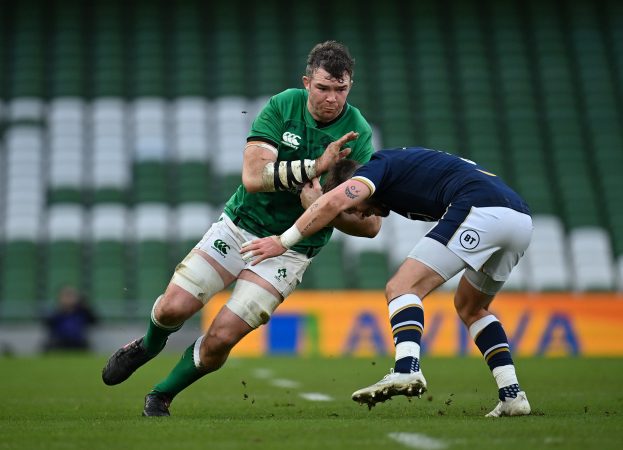An exclusive column from the Munster and Ireland back-row who is part of the Rugby Players Ireland board
The Peter O’Mahony column
THE ISSUES around health and brain injury are obviously at the forefront of everyone’s mind at the moment, especially after the stories we’ve seen in recent months. Player welfare is always at the top of any player association’s remit. Looking after their wellbeing is paramount.
It has also been the busiest year from a player representative point of view I can remember. Negotiating pay cuts and deferrals in a tough time – it’s not easy to do. A lot of decisions made in the last six to nine months affected a lot of people and it felt like a big responsibility. But I’m very proud of what Rugby Players Ireland have built.
It’s a very serious responsibility being the voice of the athletes and it’s not one taken lightly. I’m certainly not going to sit here and say “poor rugby player”, because there are lots of talented guys paid well for what they do. But recently there has been a huge amount of anxiety and some people struggled – not just financially but with illness, with losing loved ones. We tried to be there for them with counselling or advice. There were people who had to defer mortgages and we were on hand to provide services in a tough time.
Rugby has changed. Looking back at my first European game, it was against Northampton at home and I remember Ronan O’Gara kicked a drop-goal after 41 phases. That game pops up every now and then, but it’s worlds apart from today. It was cutting edge at the time
but the game has moved on in every single aspect. It was still very physical, but we have bigger, more powerful and quicker men on the pitch these days. Game psychology and how we thought then was also very different. How we prepare has come on a huge amount.
There are a lot more guys tapping into the thought processes, and interestingly it’s about taking pressure off even though performance is paramount. Focusing on results, the global season comes to the forefront of biggest likely changes. It’s about aligning seasons but you have to fit all the rugby in – there are a lot of big, big games now!
If you play international rugby it’s very rare you get a break at all and if you do you will miss out on a big one. By the looks of things, games are only going to get bigger and more frequent, so how they squeeze them all in I don’t know. It will become the biggest talking point.

Good to talk: After facing England (Getty Images)
When it comes to season structure, I think the athlete’s voice is the most important of all. They are the ones who will be in the middle of it. When we talk about how we train as well, I don’t think the answer is having no contact – people need to practise and learn it. There’s a lot to think about, with more Test competition and potentially more games in Europe.
Players are represented in discussions about big issues on World Rugby’s player board. But there, or with new competitions, they must be involved from the very start. And if not, as players must be on top of performance, recently retired players have to be involved from the
start. It would be wrong to bring players in a few months down the line and say, “These are your three options” on major decisions. What if none of them suit?
In busy seasons, the Lions tour merits exceptions. It’s special. It should be given the best chance to kick on and the beauty is that they come together, all of a sudden play one of the best teams in the world and are competitive. That needs to be given respect. But at the same time, the businesses that are clubs nowadays want to win things. And they need to stay afloat. All these private owners around the world are a different animal to what we have.
In Ireland we have this incredible system we run with the IRFU, but at the end of the day the four provinces are also a business with the union and need to do what’s best for them. We will try to do what’s best for the players.
This article originally appeared in the February 2021 edition of Rugby World magazine.
Follow Rugby World on Facebook, Instagram and Twitter.





